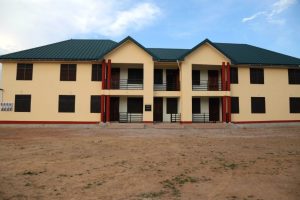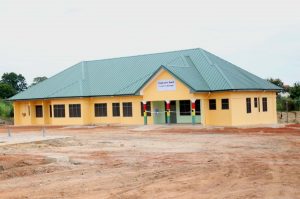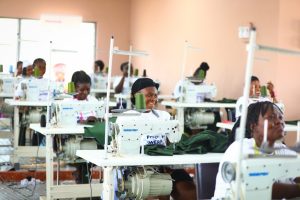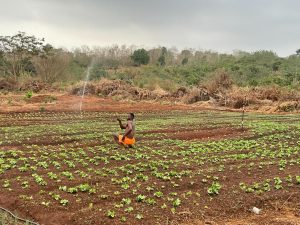In the same way that mining supports the way we live, it also cushions economic growth and development. Mining of precious metals like gold has been a major contributor to socioeconomic development in many African economies.
Mining contributes to foreign exchange earnings, government revenues, employment and gross domestic product (GDP). Ghana is no exception to economies that have and continue to enjoy the socioeconomic impact of that particular extractive sector.
Gold mining in Ghana has been practiced for over a century and involves multinational companies, small scale mining firms, and illegal miners also known as ‘glassier’.
One of the leading multinational mining companies in the industry is Newmont Ghana, a subsidiary of Newmont Corporation, the world’s leading gold mining business. In 2002, Newmont acquired its first concession through Normandy Mining Limited. Currently, the company operates two mines in the country-Ahafo South and Akyem in the Ahafo and Eastern Regions respectively.

Doctors’ accommodation at Kenyase (Newmont funded project)
Since it started operations in 2006, Newmont’s Ahafo South mine has been very impactful across the spectrum of socioeconomic development. The impact of the mine spreads across the local environment (host communities) and the country at large. For instance, in 2021, Newmont made a total tax payment of GH¢1.869 billion to the state of which Ahafo South contributed GH¢777 million. As the end of June 2022, Newmont Ghana had made a total payment of GH¢1.2 billion to the government of Ghana. It covered corporate tax, mineral royalty, PAYE tax, carried interest, withholding tax and forestry levy.
Besides, the corporate social responsibility arm of the company, Newmont Ahafo Development Foundation (NADeF) has also been a major driver of sustainable development across the Ahafo mine area. The Foundation, among others, had released about $34.1 million for different projects. In all, 127 infrastructural projects were completed and handed over for use as at the end of 2021.

Other good things about mining include the technological and productivity gains that help not only the mining industry, but other sectors. In this case, one of the biggest and most positive impact of mining creation of jobs, and community funding that mining companies make to local towns and regions. Newmont’s operational areas [Ahafo and Akyem] are epitome of the description, where locals strive for opportunities – and mining can provide that. As at the second quarter of 2022, the total number Ghanaian Newmont workers at the Ahafo South and North mine was 1,311 of which 565 were locals while 746 were drawn from other parts of the country. On the other hand, subcontractors of Newmont had 3,989 employees; 1,803 of them were beneficiaries from host communities and 2,186 were recruited outside the boundaries of the mine.
The success of the Ahafo South mine coupled with the vision to expand operations have set a good foundation for the development of Ahafo North project at the Tano North area in the Ahafo Region. Newmont Africa’s Ahafo mining lease hosts two key deposits which is the Ahafo South mine with the Ahafo North Project in the Tano North Municipality.
Scope of project
The Ahafo North project is located about 50 kilometers north of the existing south mine. Facts gathered indicate that the project is 3.35 million ounces of reserves and it has a projected lifespan of 13 years. It is expected to generate about 1,800 jobs during the construction phase and 550 direct jobs during operations.
Just like many other businesses, construction firms (big and small in the Ahafo North enclave are lacing their boots to explore opportunities that will be created by the pending mining project. The companies are working around the clock to acquire all the needed expertise, equipment and certifications to tap into gold mine.
Movelta Construction Ltd. is a Yamfo-based supply and construction firm which was incorporated in 2013. The General Manager of the company, Eliot Adjei Acheampong, in an interview said: “We are bracing ourselves to maximize the opportunities that Newmont Ahafo North project will generate. I’m aware of the massive construction opportunities including the resettlement development. This will open the floodgates to employ more during such developments. I’ll appeal to Newmont to help develop the capacities of local construction firms so that we’ll meet their requirements to secure contracts within their space.”
Sources within Newmont revealed that the company in partnership with international and local companies has started a training programme for construction workers. The target is the locals in the five host communities where selected candidates will be trained and equipped with employable skills such as welding, scaffolding, masonry, and carpentry among others.
Development of small-scale enterprises
Many residents have high hopes that the project will stimulate the local economy for exponential growth and development and therefore prudent for them join the business fraternity. Many are now venturing into different entrepreneurship activities, ranging from micro, small and medium-scaled enterprises. The people have started profiling potential profitable businesses to determine exactly what type of business is the best choice to invest in. On the other hand, existing businesses are also working around the clock to sharpen their skills and expand operations in order to tap into the anticipated economic development in that part of the Ahafo Region.
It is not out of place that Newmont in partnership with the German Development Cooperation (GIZ), has initiated a women economic resiliency programme (WERP) for the host communities. The US$420,000 initiative seeks to promote the growth and development of women-based dressmaking enterprises through technical and business management trainings. The programme with a well-equipped training centre at Susuanso is expected to create about 300 direct jobs every year for women and young dressmakers in the host communities.

Commenting on the Ahafo North Project, the Chief of Terchire, Nana Okoh Agyemang II, said: “it is an undeniable fact that mine cannot employ everybody and therefore the youth must not fold their arms in anticipation of manna falling from heaven once the mine starts operation; even if you are fortunate to be employed by Newmont, it will not guarantee that you will be rich overnight.
The youth in the communities must be measured in their expectations with regards to securing life-changing jobs. It is important for the youth, especially those without educational qualifications and employable skills to endeavour to add value to themselves by learning technical and vocational skills. This will position them to be relevant in the expected transformation of the local economic environment. Nananom will also continue to negotiate with Newmont to ensure that the locals are not given raw deals in terms of recruitment, and procurements to boost the local economy.”
On her part, Nana Yeboah Pene, Managing Director of Ememess Co. Ltd., a cleaning services firm implored Newmont to help create the enabling environment for local businesses to transform. “As the project inches closer to become operational, many people are going to lose the source of livelihood, particularly farmers and therefore, Newmont must prioritise alternative livelihood programmes to absorb those casualties. Existing and potential small local businesses must also be supported to grow and develop so as to create more employment opportunities. For instance, my company has 18 workers; we are working assiduously to become the preferred choice to secure more contracts in the coming years. This will definitely create more job opportunities.”
Agribusiness development
On the backdrop of the Ahafo North project coming on stream, one other economic area that has great potential for growth and development is agribusiness. Traditionally, Ahafo North is largely an agrarian area. Hectares of farmlands will be consumed by the mine, and obviously, the production of food will reduce as against anticipated increase in demand for food due the influx and demographical changes. This makes agribusiness a viable sector for investors. Developments along the agricultural value chain including supply of inputs, processing, and distribution of agro products will be critical to meet the needs of the population. If the opportunity is well utilized, agribusiness will surely become one of the main generators of employment and income.
To this end, an agribusiness-based NGO at Adrobaa christened ‘Focus’ has stepped up its activities. The organization, established six (6) years ago, is into mechanized production of organic vegetables including cabbage, cucumber, carrots and lettuce. Currently, the NGO has engaged about twenty (20) youth working on its farm.

Roger Joseph Adusei-Antwi is the Chief Executive Officer (CEO) of Focus. “In anticipation of expansion of the local economy, management of the organization has resolved to equally expand our production base. We have acquired vast arable land for commercial production of exotic vegetables. We’ll employ more hands along the value chain. Focus aims to become the leading vegetable producer and supplier in the Ahafo Region and beyond.”
Conclusion
The benefits of mining to the host communities can be more sustainable and impactful, if the proportionate share of royalties, taxes and other charges borne by mining companies are returned to the local people for judicious use in the form of investment into schools, hospitals, infrastructure and alternative livelihood activities. With the Ahafo North project in sight, it is therefore incumbent on all stakeholders to help make the mine a blessing to the enclave and the country as a whole.
Source: Edward Adjei FRIMPONG
Comments